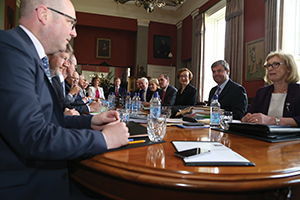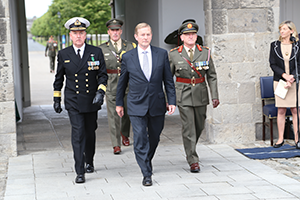Oireachtas round-up
The Government faced a barrage of criticism in the closing rounds at Leinster House before the summer recess. The one-parent family allowance, Irish Water and NAMA all featured prominently.
The sudden closure of Clerys department store was a recurrent theme during leaders’ questions mid June. Micheál Martin voiced Fianna Fáil’s concern stating: “What is happening is unethical and immoral. It speaks of a lack of respect for workers. There is an absence of decency and dignity in how this was approached.” The iconic 162 year old store went into receivership with a loss of 460 jobs and some staff receiving only 30 minutes notice after 40 years of service. The negative social impact was raised again by Gerry Adams with the Sinn Féin leader contributing to the condemnations of the treatment that Clerys workers had received at the hands of “vulture capitalists”.
The Taoiseach and opposition leaders also led tributes to the Irish victims of the Berkeley balcony collapse in California. Enda Kenny commented: “The flags of the country are flying at half-mast as a mark of respect and sympathy to the families of the bereaved,” and added: “When we look at the newspapers this morning, do we not see the faces of our own sons and daughters as they start the great adventure of life?”
Later in June, after the broadcast of RTÉ’s Collusion documentary, Sinn Féin’s Pádraig MacLochlainn used his speaking slot to raise the issue of the British Government’s failure to release its files on the Dublin-Monaghan bombings or to honour its commitment to a full and independent inquiry into the killing of Pat Finucane. In her response the Tánaiste commented: “The RTÉ documentary, with other BBC ‘Panorama’ programmes and the recent book, Lethal Allies, confirm that collusion between security forces and paramilitaries was endemic during the Troubles. Our position is that the people responsible must be brought to justice.” She added: “The Government has consistently called on the British Government to face up to its responsibilities in regard to what happened in the past. We have made it absolutely clear that an inquiry into the murder of Pat Finucane should take place. We have also said time and again both here and elsewhere that the Ballymurphy families should have the investigation they seek.”
Lone Parent Allowance
From late June, the proposed reduction of the age cap on one-parent family payments, which would exclude lone parents with children aged seven years and above (for most claimants) featured prominently on the agenda of Dáil debates. Micheál Martin lambasted the Government’s proposals and declared: “This has become known as the Burton cut but, more than that, it is a brutal cut that will plunge thousands more children into consistent poverty, on top of all the other cuts that have affected lone parent families. Up to 30,000 lone parent families will be affected by this particular move. Thousands of those will have severe income reductions as a result.”
Enda Kenny responded: “The Government has a particular programme to make work pay. We cannot allow a situation, in an economy that is recovering like ours, which bypasses thousands of households that are locked into joblessness… Jobless households with children are at particular risk of perpetuating a cycle of poverty that goes on from generation to generation.” He added: “The purpose of the phased scheme is to reduce long-term social welfare dependency, an aim with which I am sure Deputy Martin agrees.”
Martin sharply retorted: “The Taoiseach should put aside those written notes that someone gives to him to read out in answer to leaders’ questions. He should go out and meet the people who are affected. The Taoiseach is out of touch and completely detached from the reality on the ground.”
NAMA
The most explosive comments made in the Dáil prior to the summer recess emanated from Wexford Independent TD Mick Wallace. Wallace alleged that a sum of money had been set aside for the ‘deal fixers’ of the 2014 sale of NAMA’s property portfolio in the North. Deputy Wallace strongly criticised the sale and asserted: “There have been disturbing allegations around the largest ever sale of property in the history of the island of Ireland. The Northern Ireland loan portfolio, Project Eagle, involving more than 850 properties with a par value of €4.5 billion, was sold to US private equity firm Cerberus Capital Management for less than €1.5 billion, a surprise winner of the tender.” Wallace went on to allege that a routine audit of a northern-based solicitor’s firm revealed that £7 million had been transferred to an Isle of Man bank account, reportedly earmarked for a northern politician.
When the topic was raised again in the Dáil on 15 July, Ceann Comhairle Seán Barrett urged Deputy Wallace to take his allegations to An Garda Síochána and insisted: “The Deputy cannot use the chamber as a star chamber where no evidence is presented. The Deputy is affecting people’s reputations here.” Likewise, the Taoiseach encouraged Wallace to bring his allegations before the relevant accountable body within the Oireachtas – the Public Accounts Committee. In reply, Mick Wallace suggested that a commission of investigation be established in order to extract the truth about “the workings of this secret society”.
Water
The Irish Water odyssey retained its newsworthiness in recent months as the utility company made an initial refusal to reveal the number of compliant customers who had paid their first bill. Performing a U-turn, it was then revealed that only 46 per cent of payments due had in fact been made (figures including households with a private supply), falling 44 per cent short of the target set by its Managing Director John Tierney.
Enda Kenny used leader’s questions as an opportunity to express his gratitude to the customers who had paid their bills. He remarked: “I have listened to many left wing people talk about the issue recently. It is the same old story. They want to pay for nothing, make no contribution, and expect someone else to do it for them.” Adding: “The Government has been very clear about this. The charge is €3 per week or €1.15 per week. That is a very modest and fair contribution.”
Micheál Martin was scathing in his retort and commented: “The net result is that, following the introduction of the water tax, at the end of the year the Government will be down by between €35 million and €50 million. It is some feat to introduce a tax and lose money as a result of it. Only stubbornness and pig-headedness is driving the Government on in terms of trying to create the impression that all is well.” Mary Lou McDonald added to the criticisms and remarked: “Although the Taoiseach had hoped it [Irish Water] would frighten a significant number of people to pay the bills they had received, he was wrong – it did not happen. This represents more than a challenge to him, his Government and Irish Water. He has been told in no uncertain terms that his water tax is going nowhere.”
In heated fashion, and in scenes often repeated throughout the Dáil term, the Tánaiste and Deputy McDonald concluded with a final clash before the recess. Deputy McDonald noted: “I am struck by the extent to which the Tánaiste has morphed into a Fine Gael mouthpiece,” while Burton countered: “At least I am not the mouthpiece of Deputy Adams.”
Seanad
The Government faced a number of challenges in the Seanad in recent months as the opposition flexed its majority. The coalition was relegated into the minority following a failed attempt to elect John McNulty to a Fine Gael seat in the 2014 by-election. On 18 June the Government was left embarrassed when protesting senators voted down the Seanad’s Order of Business. Immediately beforehand, Fianna Fáil had led an attempt to bring Arts Minister Heather Humpreys before the second chamber to debate the Beit Foundation’s sale of Old Master paintings as “non-essential” assets, in order to fund urgent maintenance at Russborough House. Opposition senators forced a tie (17 votes each) which required the Cathaoirleach, Fine Gael’s Paddy Burke, to deploy his casting vote to defeat the proposal. Disgruntled opposition senators were then able to vent their frustration by voting down the Seanad’s agenda, prompting a suspension of the house until Fine Gael’s Seanad leader Maurice Cummins informed senators that the Government had agreed to a debate on the paintings and that Minister Humphreys would appear.
Again, on 15 July, the Government faced a series of defeats as a motion calling for Health Minister Leo Varadkar to appear before the Seanad to address the longstanding vacancy in the country’s only pancreas transplant surgeon post was passed by the narrowest of margins (24 votes to 23). Later a Fianna Fáil proposal that cuts to the lone parent allowance should be reversed was passed by 24 votes to 22 against the coalition’s opposition.
However, the Government did succeed in passing the Civil Debt (Procedures) Bill through the second stage of the legislative process. The Bill has now gone before President Higgins to be signed into law. The legislation will facilitate the court ordered recovery of debts of between €500 and €4,000, including water charges, which can be detracted from earnings or certain social welfare payments. The highly controversial Bill provoked angry scenes in Leinster House throughout it progression. Sinn Féin Senator Trevor Ó Clochartaigh described the Bill as a “panicked reaction” prompted by the public’s “huge lack of buy-in” in relation to water charges, while Justice Minister Frances Fitzgerald described the proposals as “measured”.
Labour Senator Lorraine Higgins has also brought her Harmful and Malicious Electronic Communications Bill before the Oireachtas. The proposals would legislate against electronic communication which intentionally or recklessly causes alarm, distress or harm to others. Speaking on the proposed legislation, Higgins remarked: “It is an internet safety Bill which is designed to protect children.” She added: “It’s about parents who feel powerless to help and protect them. It is about restoring decency to our online debates and engagement. It’s about internet safety.”
Meanwhile Senator John Crown has argued that, while the Bill is “well meaning”, it would undermine freedom of speech. Crown contends: “The Bill would have allowed people on the receiving end of what we believe are very valid criticisms to hide behind the legislation and protect themselves from the kind of criticism they deserved and the light which needed to be shone on their activities and deficiencies.” Seanad Éireann is currently adjourned for the summer recess and will next meet on 23 September.








